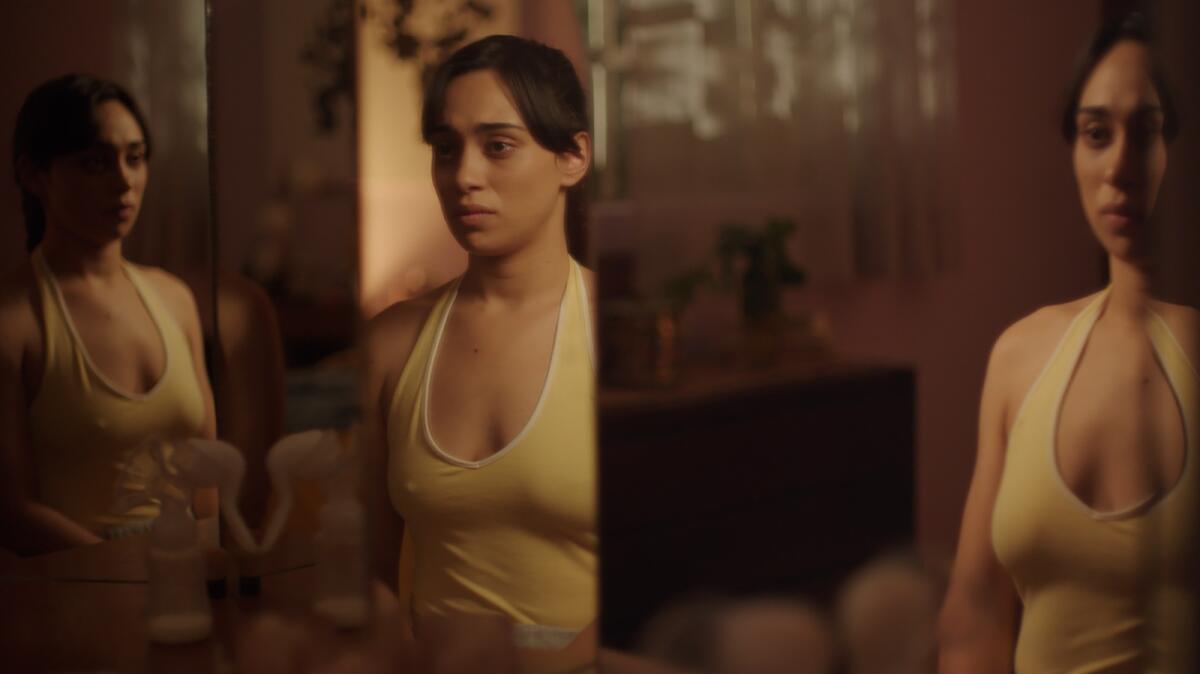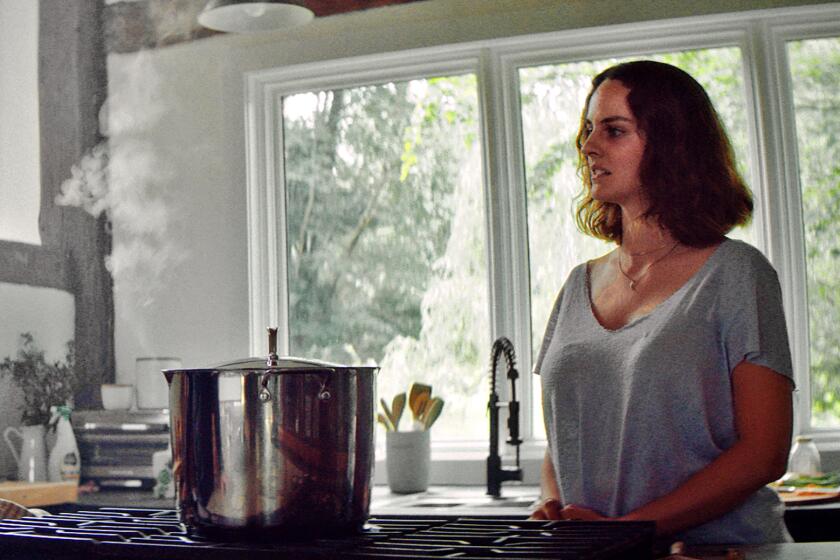A woman loses herself in bloodcurdling Mexican body horror ‘Huesera: The Bone Woman’

- Share via
Haunted by the regret of surrendering to what others deemed appropriate for her life, young Valeria (Natalia Solián) faces a tempestuous pregnancy in “Huesera: The Bone Woman,” a Mexican entry in the body horror subgenre. The remarkable debut from writer-director Michelle Garza Cervera is as effectively blood-curdling as it is intellectually incisive.
Motherhood as a mark of fulfilled womanhood weighs heavy on Valeria in a country that venerates the figure of the selfless matriarch willing to sacrifice it all for her children — a devotion entangled with the religious idolization of the Virgin of Guadalupe. Not even the joy her husband Raúl (Alfonso Dosal) radiates can ease her discomfort with this choice.
For your safety
The Times is committed to reviewing theatrical film releases during the COVID-19 pandemic. Because moviegoing carries risks during this time, we remind readers to follow health and safety guidelines as outlined by the CDC and local health officials.
The more the gestation progresses, the more her mind debilitates. Only anxiously cracking her knuckles offers her relief amid microaggressions from the women in her family, save for her aunt Chabela (Mercedes Hernández), happily single and child-free but judged for it.
Soon, Valeria’s general malaise escalates into vivid visions of a horrifying female entity whose broken bones force her to slither. The grotesque sound of skeletal breakage pierces our ears with skin-crawling effect. “When you become a mother, you feel like you are split in two,” Valeria’s mother-in-law explains to soothe her, but only augments her dread.
Garza Cervera cleverly orchestrates each scene to confront her tormented protagonist with a situation that, in the eyes of those around her, puts her readiness to be a mother in question. Solián’s harrowingly physical performance of heart-wrenching screams and painful facial expressions do more to frighten the viewer than the well-executed otherworldly incidents, because the horror is in her mounting desperation.
Disorienting, funny and scary, ‘Baby Ruby’ leaves one wondering if the protagonist is in a horror film with no escape, or simply stuck in an everyday black comedy.
“Huesera” includes no sharper visual representation of the expectations placed on women than seeing Valeria tear down her carpentry workshop to turn it into the newborn’s room while her partner’s music room remains intact. In several of cinematographer Nur Rubio Sherwell’s precise shots, the pattern on the crib Valeria built herself resembles a spiderweb that has entrapped her, and that motif reappears when she delves deeper into the occult.
Early on Raúl refuses to have sex with her, arguing concern for their growing offspring, and later he and his mother decide whether Valeria should start on antidepressants. To them, her personhood and agency become secondary to her childbearing and child-rearing roles. Even the seemingly throwaway dialogue in a dinner scene reinforces how society perceives women struggling to balance the unfair demands of family and career.
“You wanted it?” a healer asks Valeria about the pregnancy, to which her modest nod reads as far from enthusiastic. Reasons for such a doubtful response, and Valeria’s overall inner disarray, come in flashbacks to her once rebellious identity, the parts of herself she has repressed to preserve the status quo. Crucial to that forgotten, more honest version of herself was a bond with Octavia (Mayra Batalla), a nonconformist feminist woman.
Despite what one might anticipate, “Huesera” doesn’t culminate with a birth, and neither does it go in a “Rosemary’s Baby” direction. Instead, the terror pushes beyond that deadline and almost drives Valeria to commit an unspeakable act. She must seek assistance from women versed in the forces we can’t fully comprehend for a sequence that ties together all of the story’s symbols by successfully mixing digital effects and earthy mysticism.
While the movie does ultimately give in to its supernatural elements, Garza Cervera makes it known that the most terrifying nightmare in “Huesera” is the loss of self.
‘Huesera: The Bone Woman’
In Spanish with English subtitles
Not Rated
Running time: 1 hour, 33 minutes
Playing: Starts Feb. 10, Alamo Drafthouse Cinema, downtown Los Angeles
More to Read
Only good movies
Get the Indie Focus newsletter, Mark Olsen's weekly guide to the world of cinema.
You may occasionally receive promotional content from the Los Angeles Times.









